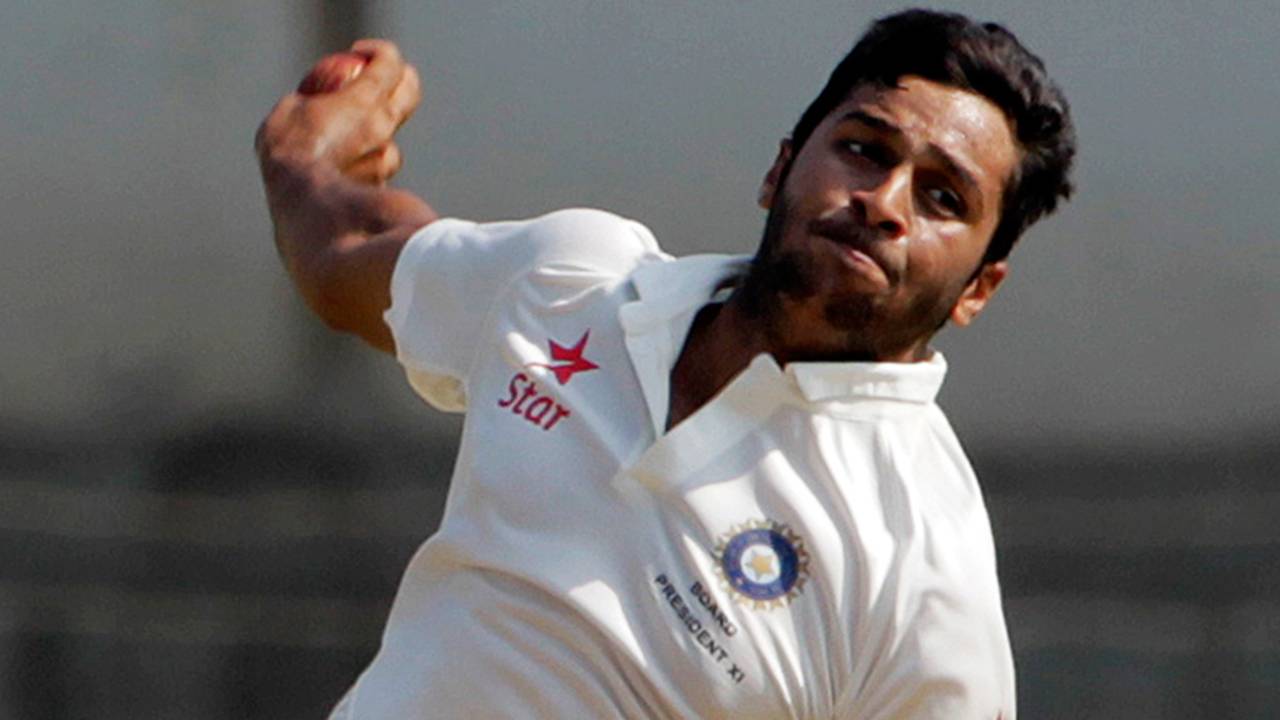Mumbai captain
Aditya Tare has singled out the batting unit for credit following their blitzing run to the Ranji Trophy knockouts this season, a logic that is hard to fault given how Mumbai's batsmen have
gunned down tall chases or buried the opposition under an avalanche of runs. Amid the flaunting of batting might,
Shardul Thakur has quietly, and efficiently, held together the bowling force.
After prising out 48 batsmen in 10 matches in 2014-15 - he was the joint highest wicket-taker in the competition along with Karnataka captain Vinay Kumar - Thakur has 29 wickets from eight games so far this season, including a six-for in the last match against Gujarat, and leads Mumbai's bowling charts.
The assurance that comes with being a regular in the team, of being the spearhead, has considerably enhanced his hunger for big-ticket performances. "Earlier I was looking to cement my place in the Mumbai team. But now things have changed and I am a lot more focused for winning the game for my team," Thakur told ESPNcricinfo.
Apart from a brace of four-wicket hauls in Mumbai's victories over Punjab and Railways, Thakur has come good with the bat as well, and also chipped in with an unbeaten 38 as he and Iqbal Abdullah completed a
record-chase against Madhya Pradesh.
Notwithstanding the impressive numbers over the last three seasons, Thakur had no illusions of where he stood after he was brought down to earth by AB de Villiers in a
tour game against the South Africans where he took 4 for 70.
"I thought it was a good ball and that he had played a very good shot," Thakur had said later. "I went and asked him why he hit that ball for four because I thought it was a good ball." De Villiers' response was as pithy as it was crushing, "For me, it wasn't a good ball."
"Obviously I wanted to look at myself [after the South Africa game] where I would stand after this game," Thakur said. "It was a learning curve. I could exactly know where I was.
"If you have to survive a high class of cricket, you have to better your skills day by day. Batsmen also try to improve, they also come with some improvement in every game they play, so you need to spot what he has improved and improve your skills."
By his own admission, Thakur was a late bloomer. He was an "on and off" player at the Under-15 and U-19 levels, and his maiden first-class season, 2012-13, was hardly flattering even if winning the Ranji Trophy that year proved to be a "game-changer."
But, his success didn't come immediately as being overweight made his ascent all the more steep. Thakur realised he had to lose a few kilograms to crank up his pace.
"Before my Ranji debut season I had dived and fell down on my knee - even then I was a little bit [over]weight, after that injury I put on even more weight," Thakur said. "Immediately I went on to play a lot of matches as I had to make a comeback in the team, and so there wasn't any time [to work on my fitness]."
However, he made the off-season count, and dropped 12 kilos by employing a variety of methods, including altitude training. "I really worked hard with my trainers. I used to go to altitude training in Juhu, and also work on my diet.
"I follow the nutritionist's diets [religiously]. I don't like olive oil but I had to take it (chuckles). I sometimes miss eating [pastries and cakes], I ate for sometime and then it was completely off."
The hardwork paid off as Thakur found he had increased his pace by about "two or three kilometres". That he has bowled 268.4 overs this season, the most for a Mumbai bowler, is a testimony to his fitness. Thakur, though, was more satisfied with his ability to out-think the batsman.
"It takes time, takes longer spells [to work out batsmen]. It doesn't happen in couple of overs, takes three, four or five overs [to set someone up]," he said. "I try to think out the batsmen [and a] lot of times I have been successful. I don't like to show it [anger] too much.
"There are many [instances]. I think against Baroda [this season], I was really charged up and going hard at batsmen. I kept on bowling outswingers, outswingers and outswingers. That spell I bowled really fast to Deepak Hooda, [Sagar Mangalorkar] and Hardik Pandya. Then I could get them out by bringing the ball back in."
While Thakur revels in harrying the batsmen with short-pitched stuff, he admitted to trying to get better on unresponsive pitches. "I am learning how to bowl well on flatter wickets and turning tracks. Most of the matches [this season] are played on such tracks, we haven't played much on lively pitches."
Unlike many contemporary cricketers, Thakur isn't coy about his personal ambitions, despite eventually settling on the template of the team's victory being more important. "Obviously [I am] looking for my personal gains also, maybe if I am selected for India A or India team," he said. "Even those things are on my mind. But, the ultimate goal is to win the game for my team."
Arun Venugopal is a correspondent at ESPNcricinfo
